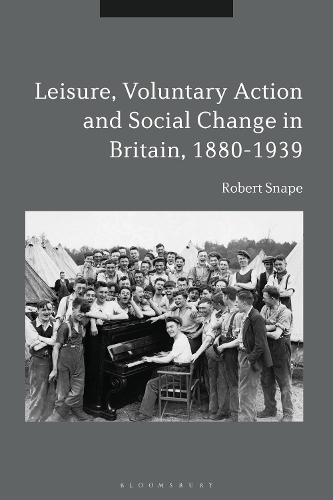
Leisure, Voluntary Action and Social Change in Britain, 1880-1939
(Hardback)
Publishing Details
Leisure, Voluntary Action and Social Change in Britain, 1880-1939
By (Author) Robert Snape
Bloomsbury Publishing PLC
Bloomsbury Academic
5th April 2018
United Kingdom
Classifications
Professional and Scholarly
Non Fiction
Sociology: sport and leisure
306.0941
Physical Properties
Hardback
256
Width 156mm, Height 234mm
540g
Description
In the final decades of the nineteenth century modernizing interpretations of leisure became of interest to social policy makers and cultural critics, producing a discourse of leisure and voluntarism that flourished until the Second World War. The free time of British citizens was increasingly seen as a sphere of social citizenship and community-building. Through major social thinkers, including William Morris, Thomas Hill Green, Bernard Bosanquet and John Hobson, leisure and voluntarism were theorized in terms of the good society. In post-First World War social reconstruction these writers remained influential as leisure became a field of social service, directed towards a new society and working through voluntary association in civic societies, settlements, new estate community-centres, village halls and church-based communities. This volume documents the parallel cultural shift from charitable philanthropy to social service and from rational recreation to leisure, teasing out intellectual influences which included social idealism, liberalism and socialism. Leisure, Robert Snape claims, has been a central and under-recognized organizing force in British communities. Leisure, Voluntary Action and Social Change in Britain, 1880-1939 marks a much needed addition to the historiography of leisure and an antidote to the widely misunderstood implications of leisure to social policy today.
Reviews
[A] broad-ranging book covering sixty busy and important years in modern British history. The clear chapter titles mean that they could very easily be set as enjoyable reading for undergraduate and postgraduate students to good effect, due to its valuable combination of interesting stories and sophisticated conceptualization. * Canadian Journal of History *
[The book's] great value lies in stressing the relationship between politics, pleasure, and people ... An effective, stimulating volume that will serve to prompt (it is to be hoped) a reconsideration of leisure and voluntary action as political forums in early twentieth-century Britain. And, indeed, in early twenty-first-century Britain. * Twentieth Century British History *
A fascinating account of how a wide range of different groups and individuals saw and promoted leisure as a means of reforming society for better. This is a book full of fascinating details and is based upon a vast array of research. * Martin Johnes, Reader in History, Swansea University, UK *
Robert Snape offers a new and compelling perspective on voluntary action and social services by placing associational leisure at the center of its narrative. This analysis of work and youth leisure provide valuable insights into social welfare in 20th century Britain. * Sandra den Otter, Associate Professor of British History, Queen's University, Canada *
Author Bio
Robert Snape is Head of the Centre for Worktown Studies and Reader in Leisure and Sport at the University of Bolton, UK.
